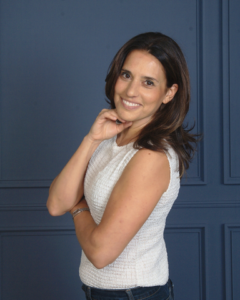You see work as so much more important than your personal needs. That’s what leads you to sacrificing your personal time, to opting to work on a project or check emails on nights and weekends, and to not have quiet enough time for self-care.
If that describes you, you’re far from alone. In fact, it was the story of Sarah Larson, someone I interviewed for the Decode Your Burnout podcast. She was so focused on her work so even when she burned out, she didn’t realize it.
Eventually, Sarah realized something was wrong, which is what landed her in therapy. It was her therapist who diagnosed her burnout and recommended, “If you don’t take time off for you, think about doing it for your organization.” The idea is that by helping herself, she would be able to help the organization by proxy.
She needed to adopt the mindset that would allow her to step away from her work when what she really wanted to do is stay glued to her chair and be productive.
Shedding the Workaholic Mindset
Have you ever known that doing something would be good for you, but still found it hard to do it? Certainly, we see this all the time when we have to make decisions about what to eat and choose the sugary snack over the piece of fruit, the beer over the glass of water, or Netflix over exercise.
Work is no different. You might know that you need to make changes, but shedding a workaholic mindset doesn’t happen overnight.
So when Sarah’s therapist told her to incorporate some self-care, at first, it felt like just one more thing on her plate. It was “supposed to be good” for her. But she listened and opted to spend some time outdoors.
After a while, it hit her. She realized she had taken a walk every day during 2020 and 2021, not because she wanted to but because she felt like she had to.
Since then, she changed her mindset about self-care. She recognizes that “anything can look like self-care.“ It doesn’t have to be a walk or an exercise class.
In addition, instead of going above and beyond at work, she was putting in “just enough effort.” On the surface, this may sound like quiet quitting, but for overachievers, doing “just enough” may still be more than what the average person does on a good day! The true testament, of course, is what happens to your productivity.
The Wake Up Call
If you’re an overachiever like Sarah was, you probably fear that scaling back your efforts at work will lead to diminished returns like decreased productivity, less opportunities for advancement, or at the very least – that you’ll be perceived as not pulling your weight.
But what if you could spend less time at work, focus more on self-care, and still have the same level of productivity…but without the burnout?
There is this myth that the more hours we pour into work, the more we accomplish, but our brain can only focus for so long. Our body needs to move. We need rest. We need to play. Without the balance between work and life, your productivity will go down after 55 hours. Therefore, staying glued to your chair is defeating the purpose.
When Sarah realized this, she said: “It rocked my world.”
She challenged herself. “It was a real mindset shift for me to take a step back from putting my all into pretty much everything and just being like, ‘Hey, what if I just do the required amount? What if I only work 40 hours instead of 60 or 80 and have my work product come out the same?’” And that’s exactly what happened.
But you’re probably reading this and wondering, “Can that work for me?”
Think Like a Scientist
Mindset is one piece of the puzzle, but you really have to experiment like a scientist to discover what’s possible.
When you think of a science experiment, you have a hypothesis you think is true or you hope is true. You document everything you’re doing and then pull the trigger. Then you look at the data and determine whether you were right or wrong.
That’s the approach Sarah took. “What I had to tell myself was, you know, I am a scientist at heart. I love to experiment. This is just an experiment. Yes. I’m just gonna try it once, you know, and if it works, cool. We’ll see where it goes from there. And if it doesn’t work, all right, let’s try something else.”
What I love about this approach is that it allows you to be open-minded to anything but it also pushes the envelope rather than keeping you stuck, assuming that you can’t do it differently, or being afraid of what you might discover.
For Sarah, it ended up working. Her productivity stayed the same. She was better rested. Her brain worked better. She was able to focus more.
The Brain Challenge
“When we think that we have to put in [a certain] number of hours, we’re not focusing on the results. We’re focusing on time.”
When you challenge yourself to get the same amount of work done in 40 hours instead of 60, it forces you to prioritize and focus, to remove all the busy work, and get pinpointed on the most important things that move the needle.
I set up one of my clients, Sally, on a similar challenge. At the end of one of our coaching calls, I asked her how many shifts she was going to have before our next session. She said three.
Sally was someone who found it impossible to get her work done in the time she had. That’s why she’d come early to work and leave late. As a result of working together, we uncovered that the reason for this was her perfectionism.
So I challenged Sally with what I called the “Three Shift Challenge.” Her job was to show up on time and leave on time for the three shifts before our next call.
By prioritizing the most important tasks, staying mindful of instances when her mind wanted to wander and was prone to distraction, and by eliminating anything that would have been “nice to do” but wasn’t essential, Sally was thrilled to discover that she could work less while still getting her work done, leaving her ample time for herself outside of work.
What You Do on Weekends Affects Weekday Productivity
When you’ve pushed hard all week, by the time your weekend arrives, you may have no gas left in the tank to enjoy yourself. This is especially true if you’re burned out.
But given that you’ve worked hard all week, you want to salvage your personal time, so you still go out and expend energy you didn’t know you had. This only exacerbates the problem.
The reason you’re so out of sorts is because you lack balance. Not only are you wasting your weekends, in a sense, but Sarah also found that her productivity on Mondays, Tuesdays, and Wednesdays was very low. It took a few days to really get her mind to focus and start producing results.
“But as I started taking full on weekends off, so to speak, my productivity on Mondays shot through the roof.”
Becoming More Mindful of Your Time
So far, we said it’s important to change your mindset that you CAN work less hours while achieving the same results. We touched on the importance of resting on weekends. Finally, we talked about the importance of focusing your mind while at work in order to get more done in less time. The question, then, is how can we focus better?
One of the ways to focus better at work is by doing a time audit. It’s where you jot down everything you do throughout the day. This not only gives you a better sense of how you spend your time in terms of the types of tasks you’re engaging in, but also gives you an understanding of how much time everything takes. In addition, because you’re writing everything down, it keeps you more mindful of what you’re doing which bleeds into your decision making.
Having a log of all your tasks also allows you to take a retrospective look at your previous work and consider what really energized you and what drained you. Armed with this information, you can start eliminating certain tasks while focusing more on others.
When Sarah did a time audit, she also discovered “pockets of things” that she really enjoyed. Armed with this information, she was able to intentionally and strategically design her workday to include more of what she enjoyed and energized her and less of what was draining.
Conclusion
Burnout is what can happen when we put too much into work and too little into ourselves. While no one would wish burnout upon themselves, this experience can often be a wakeup call that allows us to re-strategize how we show up.
Focusing on yourself first may be difficult at first if you’re an overachiever, but like Sarah, you may realize how much happier it makes you feel, and that because you’re more energized and focused, your productivity stays strong but you accomplish your work in less time.
—————————-
Do you want to get my Burnout Checklist for free?
I’ve created a checklist to help you identify signs of burnout and steps to take to get immediate results. Curious?
Author



Recent Comments